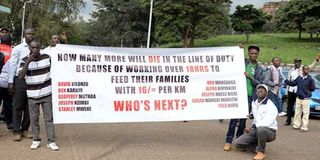City online app taxi drivers protest over reduced earnings

Striking Uber drivers protest at Uhuru Park, Nairobi in July 2018. One year later, on July 15, 2019, the online app taxi drivers were at it again, protesting over unfair commissions from US-based Uber, Estonian firm Taxify and locally owned Little Cab. PHOTO | FILE | NATION MEDIA GROUP
What you need to know:
- The officers threw tear gas at the taxi drivers who had gathered at Uhuru Park, forcing them to scamper for safety.
- The drivers are demanding an immediate withdrawal of the Uber Chap Chap and Bot Go services.
- Mr Omolo alleged that his association has lost 10 members due to accidents caused by fatigue in the last two months.
Police officers have dispersed a demonstration by online app taxi drivers who were protesting unfair commissions from US-based Uber, Estonian firm Taxify and locally owned Little Cab.
The officers threw tear gas at the taxi drivers who had gathered at Uhuru Park, forcing them to scamper for safety.
Prior to the police action, the drivers had planned to march to the office of Nairobi Governor Mike Sonko and that of Transport Cabinet Secretary James Macharia.
Demonstrators later regrouped at Uhuru Park where they announced that their leaders had been granted audience by the governor's personal assistant to air their grievances.
MOU
According to Peter Mutuku, one of the officials of the Digital Online Taxi Association, the drivers had signed a memorandum of understanding in July 2018 with other stakeholders in the sector including the transport CS, the digital app companies Bolt, formerly known as Taxify, Uber, Little Cab and others.
“We signed an MoU that was to be honoured in 2019 but this is yet to happen. Before the agreement could be enforced, digital taxi companies came in with yet another set of terms and conditions, which they proceeded to apply on the business, leaving us worse off economically due to reduced earnings,” he said.
IGNORED COMPLAINTS
Mr Mutuku accused the digital apps companies of ignoring the complaints and concerns raised by taxi drivers, saying they have continued to subject them to what he termed as “unrealistically low payments” despite the increase in fuel prices and other expenses.
“We have been pleading with the digital taxi firms to review our terms and conditions of service but they have always given us a deaf ear,” he said.
He attributed the drivers’ plight to a vicious price war between Uber and Taxify, adding that the two firms are in a constant competition as they seek to undercut each other in a bid to win more customers.
PRICE WARS
“The two firms are engaged in a vicious price war that mostly involves slashing the rates they charge in a bid to woo more customers. These price cuts have led to the drastic reduction in taxi drivers’ earnings as they have kept their commission constant at 25 percent of our takings per ride,” said Mr Mutuku.
According to Jeremiah Kang’ethe, the drivers are demanding an immediate withdrawal of the Uber Chap Chap and Bot Go services, which he said have reduced them to mere slaves chasing after an elusive profit margin.
“When Uber Chap Chap was first introduced, it was meant to cover a radius or maximum distance of seven kilometres from the CBD. Now it has been expanded to cover all distances and this has really cut down on our profit margins. If the app firms want us to cooperate with them, these two services must be immediately withdrawn or scaled down,” he said.
SHRINKING REVENUE
According to Mr Vincent Omolo of the Digital Taxi Owners Association (Ditac), the relationship between Uber and taxi drivers was only good in the initial stages of the digital app’s entry into the Kenyan market.
“When Uber first came into the Kenyan market, business was very good for us. I could afford to work for eight hours a day with a comfortable two hour nap between 12 noon and 2pm. Things have now changed with the revenue shrinking so badly due to cuts in the rates charged that I sometimes have to work for up to 24 hours or more,” he said.
DEATHS
Mr Omolo alleged that his association has lost 10 members due to accidents caused by fatigue in the last two months, adding that drivers are forced to work for longer hours in order to make ends meet.
“A trip from the CBD to the Kempinski Hotel will cost an average of Sh150.This will not change whether the driver gets caught up in traffic jam or not. The same case applies to longer trips that will cost around Sh750 or more to destinations outside the city limits like Kinooo, Thika, Syokimau or Joska. The rates do not change despite the time we spend in the jam and this has severely reduced our profit margins,” he said.
Mr Omolo said rates charged within the city by the taxi firms are too low compared to what they allow drivers to charge in other urban areas.
LESS PROFITS
“In Kisumu, Taxify charges Sh42 per kilometre, while Uber charges Sh35 per kilometre in Mombasa. Why should we be forced to charge Sh16 per kilometre in Nairobi?” he wondered.
Mr David Munene, a taxi driver, said the low rates charged by the firms along with bonuses offered to frequent users have means they make less profits than boda boda riders.
Mr Munene called on the government to step in and protect local taxi drivers from what he termed as painful exploitation by foreign-owned firms, adding that the firms do not care about the welfare of local cab drivers.




